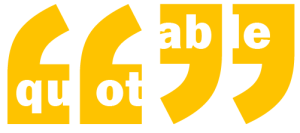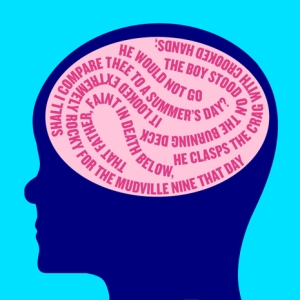I say “like” a lot. Like, a lot more than I would like. Most people out there probably have some similar word (fillers like “um”, “you know”, and “alright”) and have entertained the hope to overcome this vocabulary addiction. In primary school, the first tactic I learned to overcome my “like” habit was memorization. From nursery rhymes to full Shakespearian soliloquies (and most recently, full SNL sketches), I’ve memorized it all, and along the way, I’ve gained a lot more than a few less “likes”. Despite my distain for rote memorization, there is something to the process that’s meaningful; something along the lines of “You are what you know”.
If you can keep your head when all around you,
are losing theirs and blaming it on you.
If you can trust yourself when all men doubt you,
and make allowance for their doubting to.
In modern education, we have an allergy to memorization. And rightly so, it’s hard to rationalize memorization of a textbook worth of facts or a timeline worth of names and dates when there is a near infinite font of knowledge at our finger tips at all times. We still memorize some things (mostly song lyrics, usually the most annoying ones) but there is something important in the act of memorization that is eroding, a tacit knowledge that falls a bit closer to art than science.
If you can wait and not be tired of waiting,
or being lied about, not deal in lies.
Or being hated, not give way to hating,
nor look to good or talk to wise.
 As a youngin’, I was a big memorizer. I can still recite the introduction to the constitution, most of the Declaration of Independence, the movie The Grinch (with Jim Carey), and endless snippets from the Harry Potter books (shoutout to Jim Dale, narrator, who practically raised me). Recently my memorization has inadvertently revolved around Saturday Night Live sketches. I don’t want to brag, but my roommates and I can perform a near perfect recitation of The Grouphopper, 39 Cents, and by far our favorite, Wishin’ Boot (but actually if you haven’t seen this, treat yourself).
As a youngin’, I was a big memorizer. I can still recite the introduction to the constitution, most of the Declaration of Independence, the movie The Grinch (with Jim Carey), and endless snippets from the Harry Potter books (shoutout to Jim Dale, narrator, who practically raised me). Recently my memorization has inadvertently revolved around Saturday Night Live sketches. I don’t want to brag, but my roommates and I can perform a near perfect recitation of The Grouphopper, 39 Cents, and by far our favorite, Wishin’ Boot (but actually if you haven’t seen this, treat yourself).
If you can dream and not make dreams your master,
If you can think but not make thoughts your aim,
If you can meet with Triumph and Disaster,
and treat those two imposters just the same.
Some pretty magical stuff happens when you memorize this kind of art. I am terrible at accents, but when I sing Wishin’ Boot, my Southern twang is as strong as Alabama iced tea is sweet. This is because memorization isn’t just about words, it’s about context. It’s about who said it (or wrote it) and how, what it looked like, what you were thinking and feeling when you carved it into your mental tablet, even those crazy pneumonic devices you made to help you remember. Memorization transforms words and ideas from language into physical things; intangible thoughts become fixed memories that are durable through time like words rarely are. When you memorize words, even though they are someone else’s, they are suddenly yours too.
If you can bear to hear the truth you’ve spoken,
twisted by knaves to make a trap for fools,
And see the things you gave your life to broken,
and stoop and build them up with worn out tools.
Memorizing something meaningful is a powerful thing. It usually requires spending an incredible amount of time with the idea, and whether intentional or not, true memorization requires some breakdown and digestion, some stewing in the depths of the imagined world. Memorizing a poem requires spending time with every word, not as you do when you read normally, but on another level, understanding its physical context in a space, and in a way the space is both physical and figurative. Lasting memories require connection, it requires investment in time and thought, and when you give these resources to words, they start to mean more than they ever could when the price was just a fleeting glance.
If you can make one heap of all your wins,
and bet them in one turn of pitch and toss,
and Lose, and start again at your beginnings,
and never breath a word about your loss.
 Our paradoxical interest in glorifying greatness and uniqueness in the same breath has a tendency to make people think that greatness flows from uniqueness or vice versa. But my experiences in memorization teach the opposite, the first step towards greatness and uniqueness is imitation. Knowing what greatness looks, sounds, and feels like at every level, understanding the state of your chosen art and studying the maps of others’ journeys helps drag uniqueness and greatness into the realm of possibilities.
Our paradoxical interest in glorifying greatness and uniqueness in the same breath has a tendency to make people think that greatness flows from uniqueness or vice versa. But my experiences in memorization teach the opposite, the first step towards greatness and uniqueness is imitation. Knowing what greatness looks, sounds, and feels like at every level, understanding the state of your chosen art and studying the maps of others’ journeys helps drag uniqueness and greatness into the realm of possibilities.
If you can force your heart and nerve and sinew
To serve your turn long after you are gone,
and so hold on when there is nothing in you,
except the will that says to them “Hold on!”
If you compare the poem in this article to an original version of Rudyard Kipling’s poem “If”, you will undoubtedly found that I have made many, many mis-recollections. And maybe this is the first step of towards becoming unique. Since the first time I heard these words in the Muhammad Ali Museum in Louisville, KY in 9th grade, one line or another has rang true at different times, like wise little crickets hibernating in my subconscious, when an experience or a situation will trigger them to sing and a good piece of advice rings out of the past from inside my own head.
If you can talk with crowds and keep your virtue,
or talk with kings, nor lose the common touch.
If neither foes or loving friend could hurt you,
If all men count with you, but none too much.
So if you’ve heard a quote, a funny monologue, or a moving speech recently and thought, even for a passing moment, “Wow, I want to say something like that one day”, why don’t you make today that day. Commit something you care about to memory, ingest an idea and make it part of you. At worst, you’ll have a really great answer to a question or a really cool party trick, and at best, you put yourself on the road to saying or doing something in your life that will transform the world. The first step to being quotable is quoting, because sometimes you’ve gotta fake it till you make it.
If you can fill the unforgiving minute,
with 60 seconds worth of distance run.
Then yours is the Earth and everything that’s in it,
and what’s more- you’ll be a man, my Son!
